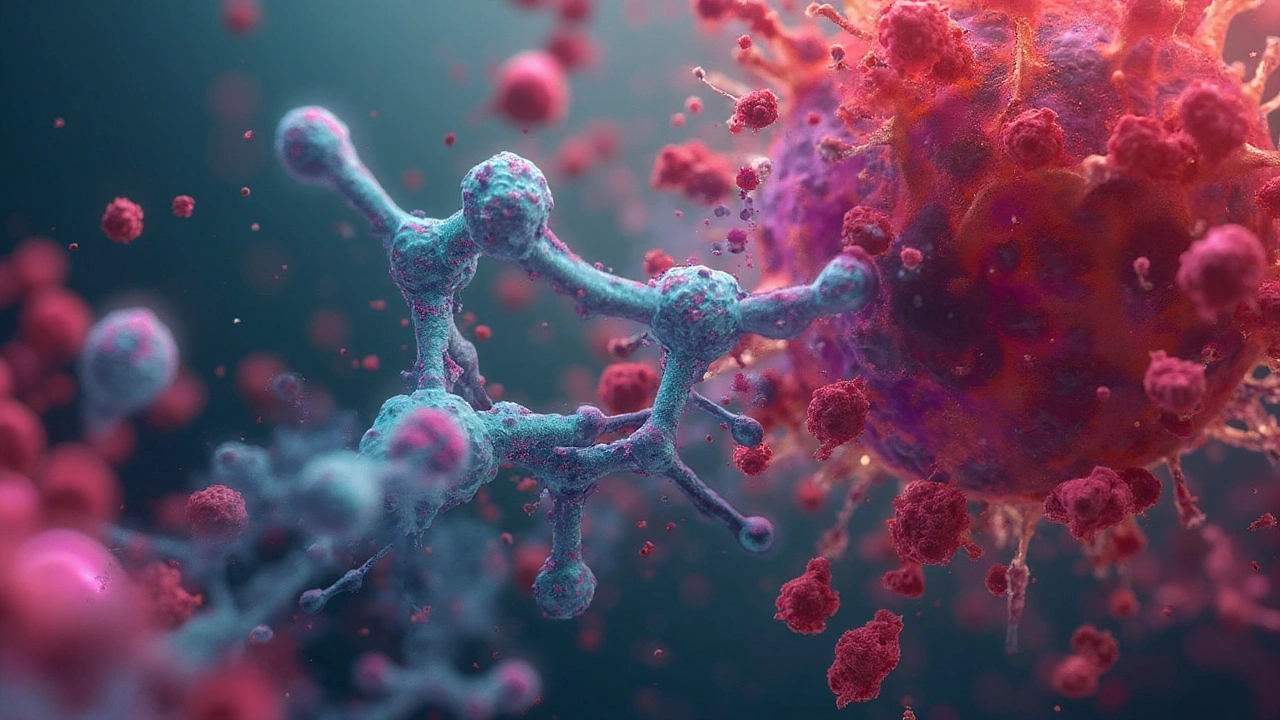- Alkeran is the brand name for melphalan, an oral/IV alkylating chemotherapy used mainly for multiple myeloma and certain bone‑marrow cancers.
- It works by attaching to DNA and preventing cancer cells from dividing.
- Typical doses range from 0.25mg/kg IV to 4mg oral tablets, prescribed in cycles that allow recovery between treatments.
- Common side‑effects include nausea, low blood counts, and mouth sores; most can be managed with medication and lifestyle tweaks.
- Key safety tips: stay hydrated, report infections early, and never skip blood‑test appointments.
What Is Alkeran?
Alkeran is the trade name for the chemotherapy drug melphalan. It belongs to the class of alkylating agents, which are chemicals that attach a small alkyl group to DNA strands. This bonding interferes with the DNA’s ability to replicate, essentially putting a brake on rapidly dividing cells - the hallmark of many cancers.
First approved in the 1950s, melphalan has been a cornerstone therapy for multiple myeloma, a cancer of plasma cells, and for certain forms of ovarian cancer and melanoma that have spread to the bone marrow. The drug can be taken orally as a tablet or infused directly into a vein (IV), giving clinicians flexibility based on the treatment plan and patient tolerance.
How Alkeran Works: Mechanism of Action
Alkylating agents like melphalan form covalent bonds with the nitrogen atoms of the DNA bases guanine and adenine. This creates cross‑links between the two DNA strands, making it impossible for the cell to unzip the helix during replication. When a cancer cell can’t duplicate its DNA, it either dies outright (apoptosis) or gets stuck in a non‑dividing state (senescence).
Because the drug targets DNA, it isn’t completely selective for cancer cells; any rapidly dividing cell - such as those in the bone marrow, digestive tract lining, or hair follicles - can be affected. That explains why side‑effects like low white‑blood‑cell counts and hair loss are common.
Researchers have also found that melphalan can trigger an immune response against tumor cells, a side benefit that is still being studied in combination with newer immunotherapies.
Typical Dosage Forms & Administration Guidelines
Alkeran comes in two primary formulations:
| Form | Strength | Typical Dose (Adult) | Administration |
|---|---|---|---|
| Oral Tablet | 1 mg, 2 mg, 4 mg | 0.2-0.4mg/kg per cycle (often 4mg daily for 7‑9days) | Swallowed with water; take on an empty stomach for best absorption. |
| IV Solution | 0.5 mg/mL | 0.25mg/kg per infusion, usually over 30 minutes. | Administered by a nurse in a clinic or hospital setting. |
Dosage is highly individualized. Oncologists calculate the exact amount based on body surface area (BSA), kidney function, and the specific cancer protocol. A typical regimen for multiple myeloma might look like this:
- Day1: IV melphalan 0.25mg/kg.
- Days2‑4: Oral melphalan 4mg daily.
- Day5‑14: Rest period (blood counts recover).
- Repeat every 28days for 4-6 cycles.
Patients receiving only oral tablets often follow a “high‑dose” schedule: 4mg daily for 9days, then a two‑week break. Regardless of the route, regular blood tests are mandatory to monitor white‑blood‑cell, platelet, and kidney function.

Common Side Effects & Managing Risks
Because Alkeran attacks dividing cells, side‑effects cluster around systems that renew quickly. Below is a practical checklist to help you recognize and manage each issue.
- Nausea & vomiting: Take anti‑emetics (e.g., ondansetron) 30minutes before each dose. Small, frequent meals and ginger tea can also help.
- Low blood counts (myelosuppression): Schedule CBCs before each cycle. If neutrophils dip below 1.0×10⁹/L, your doctor may pause treatment or prescribe growth‑factor shots (G‑CSF).
- Mouth sores (stomatitis): Rinse with saline or a baking‑soda solution 3‑4times a day. Avoid spicy or acidic foods.
- Diarrhea: Stay hydrated, use loperamide as needed, and keep a bland diet (BRAT - bananas, rice, applesauce, toast).
- Hair loss: Expect thinning or patchy loss. A soft‑bristle brush and gentle shampoos reduce breakage.
- Kidney strain: Keep fluid intake high (2-3L/day unless otherwise directed). Your oncologist may adjust the dose if creatinine rises.
Long‑term risks include secondary malignancies (rare but documented) and chronic fatigue. Regular follow‑up appointments let doctors catch these early and adjust the plan.
Frequently Asked Questions About Alkeran
Below are the questions people most often type into search engines after hearing about melphalan.
- Is Alkeran the same as melphalan?
- Yes. Alkeran is the brand name; melphalan is the generic name. Both contain the same active ingredient.
- Can I take Alkeran at home?
- Oral tablets can be taken at home as directed by your oncologist. IV infusions must be given in a clinical setting, though some hospitals now offer home‑infusion services with a trained nurse.
- How long does a typical treatment cycle last?
- Most protocols use a 28‑day cycle (one week of dosing, three weeks of rest). The total number of cycles varies: 4-6 for multiple myeloma, up to 12 for certain solid tumours.
- Will Alkeran cure my cancer?
- It can put the disease into remission, especially when combined with newer agents like lenalidomide or bortezomib. Cure rates depend on cancer type, stage, and patient health.
- Is it safe to become pregnant while on Alkeran?
- No. Melphalan is highly teratogenic. Women must use effective contraception during treatment and for at least 6months after the last dose. Men should also avoid fathering a child for 3months post‑treatment.
If you have a question that isn’t covered here, write it down and bring it to your next appointment. Keeping a symptom diary makes the conversation more productive.
Next Steps & Troubleshooting
After reading this guide, you should be able to:
- Explain what Alkeran is and why it’s prescribed.
- Identify how the drug works and what side‑effects to expect.
- Understand the typical dosage schedule and the importance of blood‑test monitoring.
- Take immediate actions when a side‑effect becomes severe (e.g., call the clinic if fever >38°C or if you notice unusual bleeding).
Should you encounter any of the following, act accordingly:
- Fever or chills: This could signal infection due to low neutrophils. Seek medical attention right away.
- Persistent vomiting: Dehydration can be dangerous. Contact your oncology nurse for a stronger anti‑emetic prescription.
- New, unexplained pain: Report to your doctor; it could be disease‑related or an adverse reaction.
Remember, chemotherapy is a team effort. Your oncologist, nurse, pharmacist, and family all play a role in making the treatment as safe and effective as possible. Keep your medication list handy, stay on top of appointments, and never hesitate to ask for clarification.

Comments (18)
Evelyn Salazar Garcia
September 21, 2025 AT 04:17
This is why I hate chemo. You're just poisoning yourself hoping it kills the bad stuff first. Good luck.
Clay Johnson
September 22, 2025 AT 15:10
Melphalan alkylates guanine at N7 position inducing interstrand crosslinks that block replication fork progression leading to apoptosis via p53 activation. The mechanism is elegant but brutally nonspecific.
Jermaine Jordan
September 22, 2025 AT 18:15
This isn't just medicine. This is war. And every tablet is a soldier walking into a minefield for you. Stay strong. You're not alone.
Chetan Chauhan
September 24, 2025 AT 09:36
I think they just make this stuff up to sell pills. My cousin took it and he got worse. Maybe its the hospital water?
Phil Thornton
September 24, 2025 AT 13:56
Mouth sores suck. I learned the hard way: no citrus. Ever.
Pranab Daulagupu
September 26, 2025 AT 03:23
Myelosuppression is a real beast. But G-CSF helps. Trust the protocol.
Barbara McClelland
September 26, 2025 AT 12:37
Hydration is your secret weapon. Drink water like it’s your job. You got this.
Alexander Levin
September 27, 2025 AT 21:50
They say it's for cancer but what if it's just a drug company scam? I heard the FDA gets kickbacks. Just saying.
Ady Young
September 29, 2025 AT 15:54
I've been on this for six cycles. The nausea is brutal but the saline rinses? Game changer. Also, ginger candies.
Travis Freeman
September 30, 2025 AT 12:47
From India to the US, this drug saves lives. Grateful for science and the people who make it accessible.
Sean Slevin
September 30, 2025 AT 21:52
I've always wondered-why is it called Alkeran? Is it from 'alkylating'? Or 'alkane'? Or... is it just a marketing word? I need to know.
Chris Taylor
October 1, 2025 AT 01:49
My mom did this. She didn't talk about it much. But she drank her tea. And slept a lot. And we loved her anyway.
Melissa Michaels
October 2, 2025 AT 20:16
Oral melphalan absorption is significantly reduced with food. Fasting is non-negotiable for bioavailability
Nathan Brown
October 4, 2025 AT 12:17
I’ve watched my brother go through this. The fear is real. But so is the hope. Keep showing up. Even on the bad days.
Matthew Stanford
October 5, 2025 AT 17:26
If you're reading this and you're scared-you're allowed to be. But you're also stronger than you think. We're all here.
Olivia Currie
October 6, 2025 AT 17:12
This drug gave me back my life. I’m not just surviving-I’m dancing again. Never give up.
Curtis Ryan
October 7, 2025 AT 13:13
I took it for 9 days straight. Lost my hair. But I kept my smile. And my dog still licked my face. That's what mattered.
Evelyn Salazar Garcia
October 7, 2025 AT 18:32
You people are delusional. This is just Big Pharma's money machine.